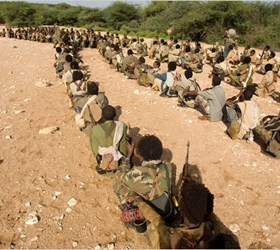
A faction of a separatist rebel group said on Sunday it was seeking peace talks with the Ethiopian government, a development that could help stabilise a region with potential reserves of oil and gas.
The Ogaden National Liberation Front (ONLF) has fought since the mid-1980s for independence for the mainly ethnic Somali province of Ogaden in southeast Ethiopia, bordering lawless Somalia.
Abdinur Abdulaye Farah, the group's representative in east Africa, said his faction was in the Ethiopian capital hoping to have talks with the government. There was no immediate comment from the authorities.
The initiative pointed to weakened secessionist activity in Ogaden, where rebels have not mounted a major attack since 2007. Several companies, including Chinese firms, are exploring for oil and gas in the area.
"More and more people want peace. There are very few people supporting the rebels now," Farah told journalists upon arriving at Addis Ababa's airport.
REBELS WEAKENED
A separate ONLF faction, which claimed to represent 80 percent of the fighters who menaced energy stakes in the Ogaden a few years back, sealed a deal with the Ethiopian government last year.
Farah said negotiations between the remainder of the ONLF and the government, held in Kenya's capital Nairobi two months ago, broke down when the rebels declined to accept the constitution and shun their armed struggle. The talks led to a further split, he said.
Other rival wings within the divided ONLF, including one run by former Somali navy chief Admiral Mohamed Omar Osman, were not immediately available for comment.
The Osman group claimed responsibility for a 2007 attack on an oil exploration field owned by a subsidiary of China's Sinopec Corp that killed 65 Ethiopian soldiers and nine Chinese oil workers, and for many other attacks on military targets over the last few years.
Addis Ababa has acknowledged past skirmishes with the rebels, but claims of battle victories from both sides have been hard to verify. Journalists cannot move in the area without government escorts.
Ethiopian forces waged an offensive against the rebels in late 2007 after the ONLF attack on the Sinopec site. Residents say the rebels have been severely weakened since then, but launch regular hit-and-run attacks including a handful of assassination attempts on regional officials.
The separatist cause originally drew support because of poverty and lack of development. Until a recent upsurge in infrastructure projects, the entire area of 200,000 sq km (77,000 sq miles) had only about 30 km (20 miles) of tarmac road.
(Editing by James Macharia and Mark Trevelyan)

No comments:
Post a Comment